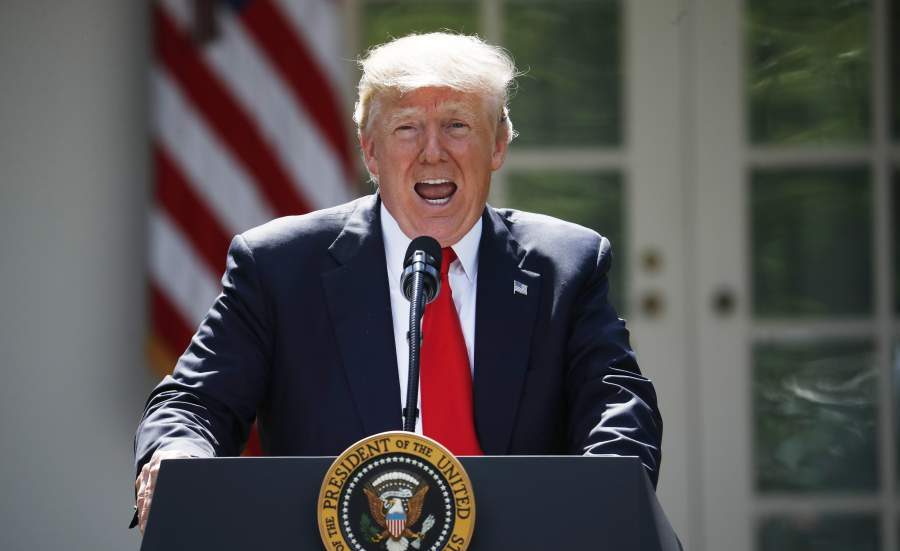As President Donald Trump prepares to meet North Korea’s Kim Jong Un for a second time, he’s out to replicate the suspenseful buildup, make-or-break stakes and far-flung rendezvous of their first encounter. The reality star American president will soon learn if the sequel, on this matter and many others, can compete with the original.
In his third year in office, Trump is starting to air some reruns.
Trump is headed into fresh negotiations with North Korea, is still pushing for his long-promised U.S.-Mexico border wall and is considering a new round of tax cuts. The focus on his greatest hits in part reflects Trump’s desire to fulfill campaign promises and energize voters for his 2020 re-election campaign. But it’s not without risks.
“The danger is the public starts recognizing this is Groundhog Day,” said presidential historian Douglas Brinkley. “You keep thinking there is a win and there is no win. It’s not clear Trump is scoring durable history points.”
With his reality TV background and instinctive sense of how to control a news cycle, Trump has long micromanaged the staging of his image, eager to project power and drama.
Those instincts were on full display during the recent scrap over his second State of the Union address. Trump rejected his aides’ suggestions that he deliver the address from an alternate site after House Speaker Nancy Pelosi, D-Calif., withdrew her invitation for him speak at the Capitol during the government shutdown. Trump opted to wait for the real deal.
“There is no venue that can compete with the history, tradition and importance of the House Chamber,” he tweeted.
In his dealings with North Korea, both past and future, Trump has been intent on ginning up excitement.
After months of trading escalating nuclear threats with the North, Trump memorably popped his head into the White House briefing room last March to hint at big news to come. Not long afterward, officials announced that a Trump-Kim meeting was in the offing.
From there, Trump teased dates and locations, threatened to cancel it — and did so at one point — before signing off on the plan for the historic meeting in Singapore last June.
Trump was delighted that the first summit received round-the-clock cable TV coverage for days, something he had hoped to repeat last summer when he met with Russia’s Vladimir Putin in Helsinki, according to two Republicans close to the White House not authorized to speak publicly about private matters. But Trump saw the Putin coverage take a negative turn after he refused to side with U.S. intelligence agencies over the Russian president in a post-summit news conference.
This time, Trump has again tried to draw out the suspense, teasing the possibility of another meeting with Kim for months and waxing poetic about his relationship with the authoritarian leader. But Trump has glossed over the fact that the first meeting produced little in the way of tangible results toward denuclearization, instead stressing that North Korea’s threats have fallen off and suggesting there is an opportunity for further progress.
Aides counseled the president that a second summit would probably not carry the same drama as the first, and needed more concrete results, but Trump urged them to push forward before deciding to announce it during this past week’s State of the Union address. He insisted to advisers that the Vietnam summit would still be must-see TV, and told one confidant that the idea of “good vs. evil” would be irresistible.
Brinkley noted there is precedent for requiring more than one summit to make a deal, citing the repeated arms control meetings between the United States and the Soviet Union during the Cold War. But he argued that those were a better investment, given that “Russia is a great power” while “North Korea is a rogue actor.”
As for other White House sequels, Trump would be happy to produce Tax Cut 2.0. He oversaw a massive tax cut at the end of 2017 and teased the possibility of another in the runup to the 2018 midterm elections. Economic adviser Larry Kudlow pushed back on the suggestion that it was simply a pre-election ploy as he spoke to reporters at the White House this past week.
“We’re kicking it around,” said Kudlow. “We’re looking at a couple of very interesting things that may wind up surprising folks.”
You can also count on Trump to continue the tough immigration rhetoric that defined his campaign and became a central part of his midterm election push. He forced the government into a 35-day partial shutdown over his demand to fund a wall along the U.S.-Mexico border and views his immigration efforts as key to his re-election campaign.
Brinkley said of Trump’s repeat performances: “He’s a child of the 1970s with boxing matches. It’s like the rematch with Muhammad Ali and Joe Frazier.”
(AP)











